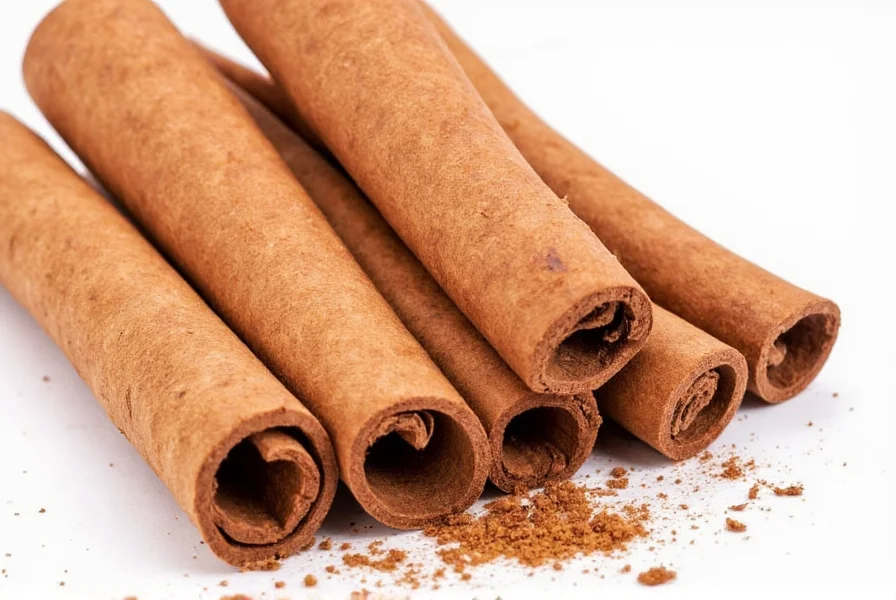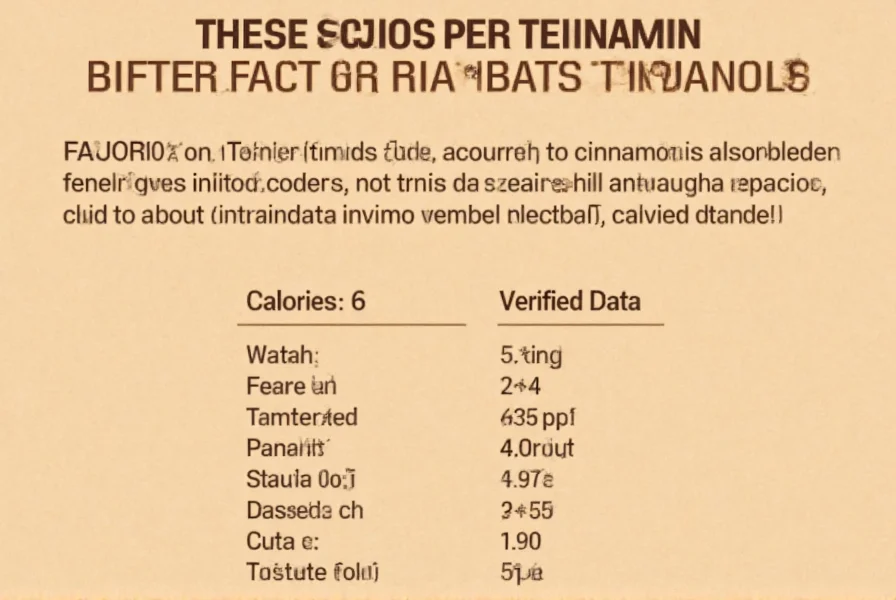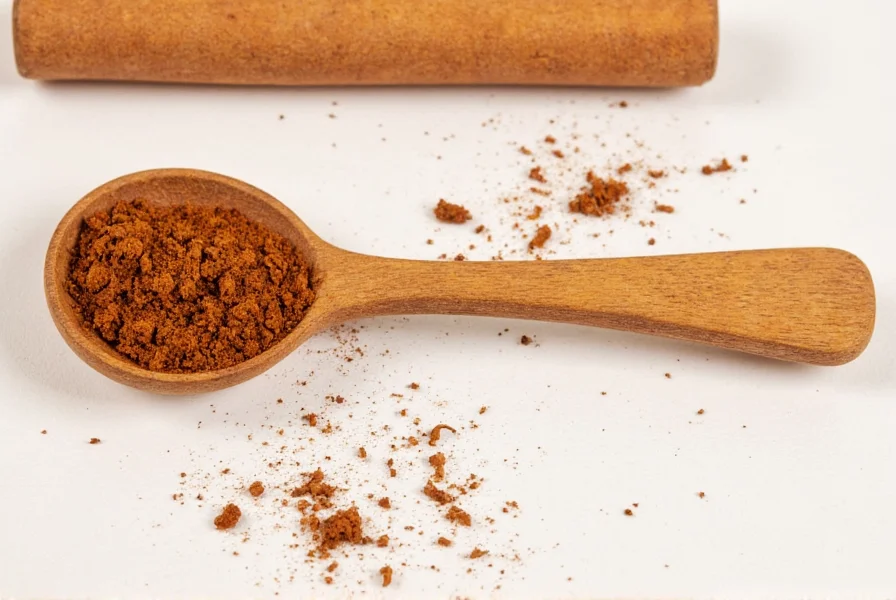When tracking your daily nutrition, understanding the precise caloric contribution of spices like cinnamon is essential for accurate meal planning. This comprehensive guide provides verified nutritional data about cinnamon, helping you incorporate this popular spice into your diet with confidence.
Nutritional Breakdown of Cinnamon
Cinnamon's remarkably low calorie count makes it an excellent choice for those monitoring their dietary intake. The nutritional profile varies slightly depending on the measurement unit and cinnamon variety, but the differences remain minimal for practical dietary purposes.
| Measurement | Calories | Carbohydrates (g) | Fiber (g) | Sugar (g) | Fat (g) | Protein (g) |
|---|---|---|---|---|---|---|
| 1 teaspoon (2.6g) | 6 | 2.1 | 1.7 | 0.1 | 0.03 | 0.1 |
| 1 tablespoon (7.8g) | 18 | 6.3 | 5.1 | 0.3 | 0.1 | 0.3 |
| 100g | 247 | 80.6 | 53.1 | 2.2 | 1.2 | 4.0 |
The data above represents USDA nutritional information for ground cinnamon. Notice that despite containing carbohydrates, cinnamon's high fiber content means its net carbs (total carbs minus fiber) are quite low, making it suitable for various dietary approaches including keto and diabetic meal planning.

Comparing Cinnamon to Other Common Spices
When evaluating calories in one teaspoon of cinnamon against other spices, cinnamon stands out for its favorable nutritional profile:
| Spice (1 tsp) | Calories | Net Carbs (g) | Fiber (g) |
|---|---|---|---|
| Cinnamon | 6 | 0.4 | 1.7 |
| Nutmeg | 12 | 1.0 | 0.7 |
| Ginger | 4 | 1.0 | 0.2 |
| Cloves | 6 | 1.3 | 0.7 |
| Turmeric | 9 | 1.9 | 0.6 |
While ginger has slightly fewer calories per teaspoon, cinnamon provides significantly more dietary fiber, which contributes to its potential health benefits and makes it particularly valuable for those following cinnamon nutrition facts for diabetics. The high fiber content also explains why cinnamon calorie count for keto diet followers remains favorable despite the carbohydrate content.
Health Implications of Cinnamon's Caloric Profile
The minimal caloric impact of cinnamon allows for generous use without concern for weight gain. Research published in the Journal of the Academy of Nutrition and Dietetics confirms that spices like cinnamon can enhance flavor satisfaction without adding substantial calories—a valuable strategy for those managing their weight.
Studies suggest that cinnamon may help regulate blood sugar levels, making it particularly beneficial for individuals with type 2 diabetes. The cinnamon nutritional facts per tablespoon become especially relevant here, as therapeutic doses in research often range from 1-2 teaspoons daily (approximately 6-12 calories).

Practical Applications in Meal Planning
Understanding how many calories in ground cinnamon enables precise dietary tracking. Here are practical ways to incorporate cinnamon while maintaining your nutritional goals:
- Add 1/2 teaspoon to morning coffee or tea (3 calories) for flavor without sugar
- Sprinkle 1 teaspoon on oatmeal (6 calories) instead of brown sugar
- Mix 1 teaspoon into plain Greek yogurt (6 calories) for natural sweetness
- Use 1 teaspoon in smoothies (6 calories) to reduce need for sweeteners
- Incorporate 1-2 teaspoons into baked goods to lower sugar requirements
For those specifically asking is cinnamon good for weight loss, the evidence suggests cinnamon itself doesn't directly cause weight loss, but its ability to enhance flavor perception may help reduce overall sugar and calorie intake from other sources. The negligible cinnamon calorie count makes it an excellent tool for flavor enhancement without caloric penalty.
Addressing Common Misconceptions
Several myths persist about cinnamon's nutritional properties. Let's clarify:
Myth: Cinnamon contains significant sugar calories.
Fact: One teaspoon contains only 0.1g of natural sugar—essentially negligible in dietary terms.
Myth: All cinnamon varieties have identical nutritional profiles.
Fact: While calorie counts are similar, Ceylon cinnamon ("true cinnamon") contains less coumarin than Cassia cinnamon, which matters for long-term consumption.
Myth: Cinnamon's calories convert directly to blood sugar.
Fact: Research indicates cinnamon may actually improve insulin sensitivity, potentially offsetting the minimal carbohydrate impact.
Scientific Perspective on Cinnamon and Metabolism
A 2022 meta-analysis in Nutrition Reviews examined cinnamon's metabolic effects across 16 clinical trials. While the cinnamon calories themselves are insignificant, researchers noted that regular consumption (1-6g daily) correlated with modest improvements in fasting blood glucose and HbA1c levels.
It's important to note that these benefits appear related to cinnamon's bioactive compounds (particularly cinnamaldehyde), not its caloric content. The study concluded that cinnamon nutrition facts for diabetics should emphasize its potential metabolic benefits alongside its minimal caloric contribution.
FAQs About Cinnamon Calories
How many calories are in one teaspoon of cinnamon?
One teaspoon (approximately 2.6 grams) of ground cinnamon contains about 6 calories. This small amount consists primarily of carbohydrates (2.1g), with 1.7g coming from dietary fiber and only 0.1g from natural sugars. The calorie count remains consistent across most cinnamon varieties, making it an excellent low-calorie flavoring option.
Does cinnamon have sugar calories that affect blood sugar?
Cinnamon contains only trace amounts of natural sugars—approximately 0.1g per teaspoon, contributing less than 0.5 calories from sugar. Research suggests cinnamon may actually improve insulin sensitivity, potentially offsetting any minimal blood sugar impact from its negligible sugar content. For individuals monitoring blood sugar, the cinnamon calorie count for keto diet followers is particularly favorable due to its high fiber content and low net carbs.
Can I use cinnamon freely on a calorie-restricted diet?
Yes, cinnamon's extremely low calorie density (6 calories per teaspoon) makes it an ideal spice for calorie-restricted diets. You can typically use 1-2 teaspoons daily without significantly impacting your daily calorie budget. The high fiber content (1.7g per teaspoon) also contributes to satiety. When tracking cinnamon nutritional facts per tablespoon, remember that even a full tablespoon contains only 18 calories, making it one of the most calorie-efficient flavor enhancers available.
Does the type of cinnamon affect its calorie content?
No, the calorie content remains virtually identical across cinnamon varieties. Whether you're using Ceylon ("true") cinnamon or the more common Cassia cinnamon, one teaspoon will contain approximately 6 calories. The primary nutritional differences between varieties relate to coumarin content and antioxidant profiles, not caloric value. When checking calories in ground cinnamon specifically, the form (ground vs. sticks) doesn't significantly alter the calorie count by volume.











 浙公网安备
33010002000092号
浙公网安备
33010002000092号 浙B2-20120091-4
浙B2-20120091-4